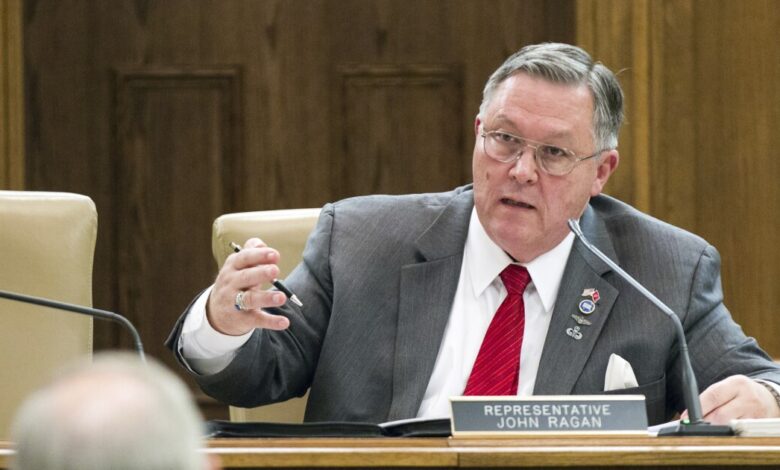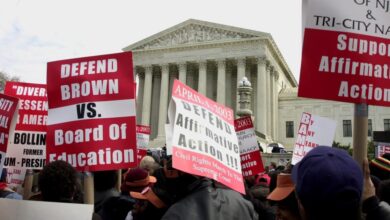In Tenn., a Lawmaker Tells Colleges to Scrub References to Gay and Transgender Rights Under Title IX

A tug of war over gay and transgender rights has escalated across Tennessee in recent weeks as public universities statewide respond to a lawmaker’s letter telling them to scrub references to Title IX protections for these groups from their policies and websites.
At issue was an August 22 email from Rep. John D. Ragan, a Republican from Oak Ridge who co-chairs the Joint Government Operations Committee in the state’s House of Representatives.
In it, he told the leaders of Tennessee’s public universities “to immediately revoke and/or remove any publications, policies, and website entries for which your institution is responsible that state or imply that LGBTQI+ students, etc., are a protected class under Title IX.” He gave them until September 2 to do so. If they didn’t, he warned, they could be violating state laws that conflict with the Biden administration’s interpretation of the federal law that bans sex-based discrimination in educational settings.
Ragan said he was sending the letter because a federal district court in July had issued a ruling temporarily preventing the U.S. Department of Education from enforcing 2021 guidance that included gay and transgender students under Title IX protections. The suspension applies to Tennessee and 19 other states that joined it in a lawsuit challenging that policy. Universities that violate Title IX risk losing federal funding, although that penalty has never been levied.
Critics of Ragan’s move, including some Democratic state lawmakers and advocates for gay and transgender people, accused him of overreaching his authority and meddling in university affairs.
Chris Sanders, executive director of the Tennessee Equality Project, an LGBTQ advocacy group, said the email “could have a chilling effect because it says the state legislature is watching you and is willing to micromanage how you manage nondiscrimination. It could also send a message to prospective students or faculty members that, if the legislature is going to go to war with our universities over this, maybe this is not the place for me.”
Rep. Vincent Dixie, Democrat of Nashville, called Ragan’s letter “frustrating and reprehensible.” He contended that it’s part of a pattern by some Republican lawmakers to demonize gay and transgender people instead of bringing Tennesseans together.
In his email to The Chronicle, Ragan said he was advising, not ordering, the universities to comply and that he had the authority to do so as co-chair of the Joint Government Operations Committee. The email, he said, “is nothing more than reminding state institutions to follow existing state law. That some people are apparently upset over prompting a public institution to adhere to the law is perplexing,” he added.
East Tennessee State University responded to Ragan’s letter by changing the wording on its website to remove specific references to LGBTQ protections under Title IX. But it made a point of saying, in a prepared statement shared with The Chronicle, that the university’s separate nondiscrimination policy will continue to cover sexual orientation and gender identity.
“The courts are currently determining whether sexual orientation and/or gender expression is considered a protected class under Title IX at universities across Tennessee and the nation,” the university’s statement said. “Regardless of that outcome, ETSU’s policy prohibiting discrimination of any kind remains in effect.”
So how much difference does the temporary suspension of the Biden guidance matter to people in Tennessee who feel they’ve been discriminated against? Many universities, like East Tennessee State, had policies on the books protecting LGBTQ members from discrimination before the latest controversy. Although institutional policies may protect them on campus, their ability to escalate the case beyond the university could be compromised if they aren’t protected by Title IX, Sanders said. He also worries that a university will feel less pressure to enforce such protections without some assurance “that the federal government has its back.”
Peter F. Lake, a professor of law and director of the Center for Excellence in Higher Education Law and Policy at Stetson University, in Florida, said colleges are likely to continue feeling squeezed between competing policies and laws on issues including transgender rights. “The Department of Education has taken strong, broad positions that in some cases conflict with state laws,” he said. But other federal laws, besides Title IX, protect gay and transgender people from discrimination, so institutions should be careful about changing their policies when such showdowns occur.
Jeffrey J. Nolan, another lawyer who advises clients on Title IX issues, said that even though the Education Department could cut funding from universities that adhere to state laws that contradict federal policies, “I would hope it would use a lot of discretion in working with schools that are caught in that bind. Each side could threaten to cut funding depending on which way the campus went, he said, and “how that game of chicken works out remains to be seen.”
The Education Department last year issued proposed regulations that would reverse Trump-era policies and formalize protections against discrimination based on sexual orientation or gender identity under Title IX. The guidance would allow trans students to use facilities that correspond with their gender identity and ban bullying based on gender identity.
Among the state laws the Biden guidance could violate, Ragan wrote in an email to The Chronicle, is one that bans transgender students from competing on college sports teams that match their gender identity. (The Biden guidance doesn’t specifically address the topic of sports participation.) In addition, Ragan said, “Requiring integration of single-sex showers, restrooms, etc., with ‘trans-whatever’” can violate indecent exposure and “observation without consent” or “peeping Tom” statutes.
U.S. and state law, Ragan said, prevent discrimination based on “race, creed, color, sex, religion, disability, or age.” Neither the Congress nor the General Assembly he said, has made gay and transgender people a similarly protected class, so “unless one maintains that LGBTQ+ is a religion or a disability,” no special protections apply. That’s an interpretation many higher-education leaders across the state might challenge, but few are eager to wade into turf wars where threats of funding cuts — either from the state or federal government — loom.
The University of Tennessee system said, in a response to Ragan, that it hadn’t changed its Title IX-compliance policies because of either the Department of Education’s 2021 guidance or the recent Tennessee court ruling. The university’s policy, it said, complies with federal and state law, as well as accrediting guidelines, and it sees no reason to change anything.
Source link






